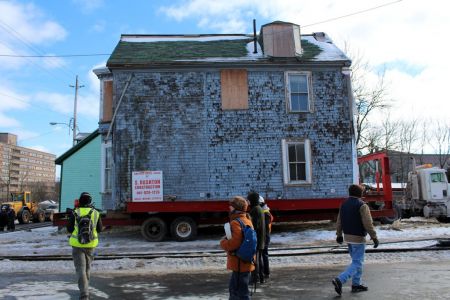HALIFAX — The young tenants eager to make Morris House their home were slapped with a rain check on their move-in date this week. Carol Charlebois, executive director of the Metro Non-Profit Housing Association, received a letter from the minister of Community Services informing her that the province will not support a request to help fund the Morris House project.
It's a set back, but it isn't the end of Morris House. “We are going ahead. It's just going to be more difficult and it will take longer,” says Charlebois. “We have some funding, but we don't have enough yet.” Much of the funding that is in place is federal.
In late January the media was abuzz with stories and pictures of the move of historic Morris House through downtown Halifax to its new destination in the North End. The oldest wooden structure in Halifax was spared from demolition, and moved to a new destination to provide affordable housing and support for nine young people who are having a hard time finding and keeping a place to live.
There is some urgency behind the initiative. Affordable living quarters for homeless young people are hard to find in the downtown core. And more affordable apartments on the outskirts of town would take these teens away from their traditional support networks.
What puzzles Charlebois more than anything is that the proposed departmental housing strategy is the reason for the denial. The strategy encourages development that supports a mix of high- and low-income tenants, old and young, subsidized renters and wealthy condo owners, all in the same neighbourhood.
In the letter to Charlebois the minister argues that in order to align with the proposed housing strategy “we should be showing real leadership by encouraging or supporting efforts that assist with individuals living in mixed communities and that all efforts should be made to avoid creating building types for a single use.”
The letter concludes: "I believe it is important for us to demonstrate that a single bespoke home should not be used for housing one single client group.” (Bespoke means made to order, or custom made.)
To Charlebois this reasoning is too simplistic. “Not to take part in a project because it puts similar clients in a single building is wrong,” says Charlebois. “It doesn't recognize the situation of some people who do better in that kind of environment. They benefit from the supportive community that we are able to create in a single building.”
At a March 7 Standing Committee on Community Services meeting the Deputy Minister of Community Services Robert Wood explained that this situation with Morris House does not mean the department will no longer support residential homes for seniors, or youth homes, or other “single homes for single client groups.”
After some back and forth between the Halifax Media Co-op and Peter McLaughlin, director of communications at Community Services, he hinted in a March 8 email dated that there were unspecified concerns with the Morris House project beyond non-alignment with the housing strategy. He wouldn't say what these concerns were. Neither was Charlebois informed of what they might be.
Then again, she wasn't surprised by the department's denial of funding.
“We used to have very good relations with government, but recently it is that attitude that they express in the letter," says Charlebois. "I believe that they really frown on what we do."



